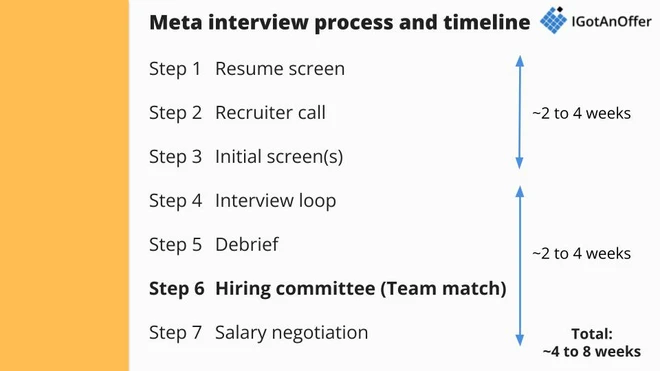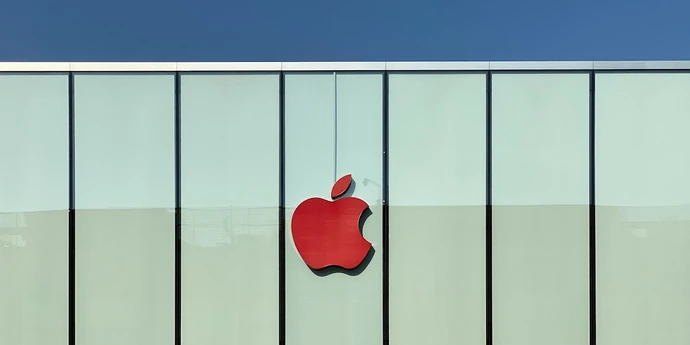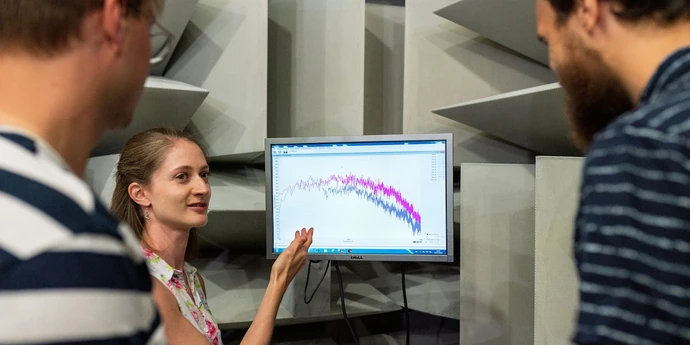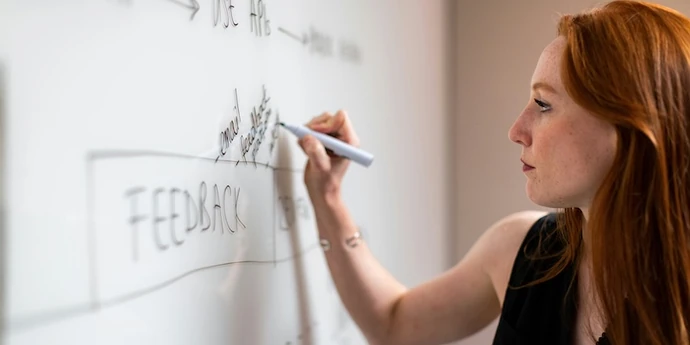First off, congratulations on passing Meta’s onsite. Before you can breathe easy, there’s one last step between you and that final offer: the team matching phase.
If you’re about to enter this stage or have been stuck here for weeks, this article is for you. To put it together, we gathered insights from Meta insiders and reviewed reports from real candidates who’ve had the same experience.
We’ll walk you through the most commonly asked questions about the Meta team matching process, tips on how to approach interviews with hiring managers, and what to do if you succeed or fail to match with a team.
- Meta team matching process and timeline
- Match validity and number of attempts
- How to navigate the process (with expert tips)
- What happens if you fail to match
- What to expect after a successful match
Book 1-on-1 salary negotiation coaching with an ex-Meta coach
Let’s get started!
1. Meta’s team matching process and timeline ↑
Before we dive into Meta team matching, it’s important to understand where it fits in Meta’s hiring pipeline.

Meta’s interview process has seven steps. The team matching phase happens after you’ve cleared the candidate review (step 6), but before you receive a formal offer (step 7).
At this stage, the hiring committee reviews a packet with feedback from your initial screen and interview loop. If you pass, you’ll enter the team matching phase, where you’ll speak with hiring managers to assess mutual fit based on your interests and their team’s needs.
In the sections below, we break down how this process unfolds, based on insights from a Meta expert and real candidate experiences shared on forums like Blind and Reddit.
1.1 What is the team matching process at Meta?
According to Devang, a senior software engineer and interviewer at Meta, candidates typically speak with 3–5 hiring managers across different teams with open headcount at your level. Each conversation lasts 45–60 minutes and feels more like a conversation than a formal interview.
You’ll also have follow-up calls with teams you're particularly interested in. An offer will only be extended once you’ve been matched with a team.
Prior to 2023, Meta conducted team matching through a 6- to 8-week paid Bootcamp, where new hires could rotate between teams before deciding which one to join.
Now, sources suggest team matching no longer happens during the Bootcamp period, but before you receive a formal offer.
Note: This process reflects the typical experience for Meta software engineering (SWE) roles. Based on candidate reports from forums like Reddit and Blind, your interview experience at Meta may differ across roles and locations.
1.2 How long does Meta team matching take?
The process from initial team conversations to receiving an offer typically takes two to six weeks. The exact timeline can vary depending on your fit with available teams, preferred location, and how quickly hiring managers can coordinate interviews.
Some candidates on Reddit also note that the process is “serialized,” meaning you're introduced to one team at a time rather than interviewing with multiple teams simultaneously.
2. Meta team match validity and attempt limits ↑
Passing Meta’s interviews is already a significant milestone. But until your offer is finalized and everything is in writing, there are still a few important things to keep in mind about the team matching process:
2.1 Does a team match guarantee an offer?
Not quite. If you can’t find a suitable team within the given deadline and number of attempts, your candidacy may expire, and you won’t get an offer.
2.2 How long is a Meta team match valid?
As mentioned in Section 1.1, the validity of your candidacy at Meta may vary. Previously, the window was a generous 12 months, but recent reports say candidates now have around 60 days to match with a team.
That timeline may be even shorter for the SWE role. Devang shares that most SWE candidates were given just 2 to 3 weeks to complete team matching.
2.3 How many matching attempts am I permitted at Meta?
Reports from U.S. candidates suggest that Meta typically gives you up to three attempts to match with a team and accept an offer. But this number isn’t set in stone. It’s always best to confirm your specific case directly with your recruiter.
2.4 Can I delay team matching or take a break from the process?
Many roles (i.e. product management, engineering manager, etc.) are competitive or need to be filled quickly, so taking a break for a few months at this stage is usually not an option. That said, it’s still worth having an open conversation with your recruiter about your availability.
One candidate on Blind shared that when she asked to delay matching, her recruiter encouraged her to move forward with the process and discuss start dates with the hiring manager after a match was found.
In her case, she was able to match with a team willing to delay her start date by three months.
3. How to navigate Meta team matching (with tips from experts) ↑
Devang brings over 7 years of software engineering experience at Meta and Amazon. He’s conducted 100+ interviews across a range of technical roles and understands exactly what top tech companies look for in candidates.
Here are some of his most important tips:
3.1 What questions to expect from hiring managers
Beyond technical alignment, hiring managers are also assessing how well you’d fit into the team’s culture. You can expect questions about how you collaborate, handle feedback, and work with cross-functional partners.
Many of these questions will feel similar to the behavioral questions you encountered during your initial and onsite interviews. But this time, expect them to be more specific to the team you're speaking with.
Come prepared to share concrete examples of your past work. These examples help hiring managers understand how you think and how your experience relates to their challenges.
Finally, always be honest when answering questions. “Hiring managers can tell when you're just saying what you think they want to hear,” says Devang.
Below are some practice questions you can expect during these calls.
Example questions hiring managers ask during Meta team match
- Walk me through a challenging technical project you've led. How did you navigate the obstacles?
- What interests you about our team's problem space?
- How do you approach technical decision-making when there are multiple valid solutions?
- Tell me about a time you had to influence without authority
- What are you looking to learn or grow in your next role?
- How do you handle ambiguity in requirements or technical direction?
3.2 What questions to ask hiring managers
Remember that team matching is a two-way evaluation. This is the team you’ll likely spend the next few years with, so it’s worth asking the hard questions.
You want to walk out of these calls knowing how the team works, what kind of problems they’re solving, and whether you can see yourself growing there.
Devang recommends asking questions across these four categories: technical considerations, growth and impact, team dynamics, and product and business context.
Example questions to ask during Meta team matching
Technical considerations
- What’s the technical stack, and how does it align with your interests or growth goals?
- What are the biggest technical challenges the team is facing?
- How does the team approach technical debt and system reliability?
Growth and impact
- What opportunities exist for technical leadership and mentorship?
- How does the team’s work tie into Meta’s broader strategic priorities?
- What’s the promotion trajectory, and how does the manager support career development?
Team dynamics
- What’s the team composition (junior vs senior, tenure, backgrounds)?
- How does the team handle on-call responsibilities and work-life balance?
- What’s the manager’s leadership style, and how do they run team meetings and planning?
Product and business context
- Is the product in growth, maintenance, or sunset mode?
- How much autonomy does the team have in technical and product decisions?
- What’s the relationship like with PM and design partners?
3.3 How to evaluate and choose between teams
Once you have all the information you need, think about how it fits into your career goals for the next two to three years and which team best positions you for that trajectory.
You should also consider what stage the team is in, says Devang. Are they in rapid growth, focused on optimization, or exploring new ideas? Each phase comes with its own set of challenges and learning opportunities, so ask yourself what kind of environment you’ll thrive in.
For example, if you're hoping to take on more leadership responsibilities, a fast-growing team that's scaling quickly might give you more opportunities to step up. If you're looking to deepen your technical skills, a team working on optimization or infrastructure could offer the kind of complex problems that help you grow in that direction.
Should you go with the first team even if it’s not a perfect fit?
Don’t stress too much about finding the “perfect” team. Devang points out that Meta has strong internal mobility. So even if your first match doesn’t check all the boxes, you can usually switch teams after 12 to 18 months. What’s more important is joining a team where you can grow, be challenged, and work with people you respect.
4. What happens if you fail to match with a team at Meta?↑
If you fail to match with a team, you’ll need to start from square one and reapply for a new open position at Meta.
If you think a lack of experience or alignment with the team’s needs held you back, we recommend waiting 12–18 months before applying to a similar role. That way, you’ll have time to build the experience and clarity needed to land the right team.
To maximize your progress before reapplying, consider working with one of our career coaches. They can help you create a focused, actionable plan for your next steps. Click here to find out more about career coaching.
And if you think it’s the right move for you, book a 1-to-1 interview coaching session with one of our ex-Meta coaches.
You might also want to check out our Meta interview rejection guide for tips on how to bounce back and better prepare for the next time.
5. You got a successful team match—here’s what to do next ↑
Once you’ve matched with a team, your recruiter will start putting together your offer. This is your chance to review the details of the offer, ask questions, and negotiate your compensation.
Many candidates aren’t sure whether they can negotiate or how much flexibility there is. But like most tech companies, Meta expects candidates to negotiate. You don’t need competing offers to make a case, and their initial offer likely isn’t the best they can do.
It’s also important to note that not all components of a Meta offer are equally negotiable. You’ll usually see the most flexibility in RSUs, followed by sign-on bonus, and then base salary.
Here are quick tips for negotiating your offer:
- Never accept the first offer right away. Ask for a few days to review and run comparisons.
- Research your market value. Use Levels.fyi and other sources to benchmark comp for your level, role, and location.
- Prioritize RSUs and sign-on. These have the most wiggle room and often account for most of the increase.
- Set a walk-away number. Know what offer you’d accept and what would make you keep looking.
- Keep it collaborative. Frame your asks as part of a conversation, not a demand.
Check out our Meta job offer negotiation guide for more tips on how to negotiate effectively, sample counteroffer emails, and advice from ex-Meta recruiters and hiring managers.
We also recommend speaking with a coach who’s helped others negotiate with Meta. They can walk you through what’s negotiable, how to craft a counteroffer, and how to avoid common mistakes that could leave money on the table.
Get support from a professional salary negotiator ↑
Our coaching team has run thousands of salary negotiations as recruiters and hiring managers. They negotiate daily and are therefore extremely comfortable with the process.
A negotiation done well should usually yield $10k+ to $100k+ in increase, depending on your role and level. So spending $150 to $500 on getting help from a coach has a huge ROI (at least 10x).
Here’s what our coaches can help you with:
- Help you understand how "hot" the overall hiring market is right now
- Finding the weaknesses in your initial offer
- Determining what a reasonable total compensation is for you
- Practicing mock negotiations over the phone
- Giving you advice in situations we haven’t covered above















